- Home
- Ralph Peters
The Damned of Petersburg Page 13
The Damned of Petersburg Read online
Page 13
Another blast tore the morning. Followed, at last, by a stunned calm.
Babcock was bleeding, but it didn’t look serious. An orderly lay dead, pierced. Others cradled wounds. Blown wild, papers floated. A saddle had dropped from the sky between Porter and Rawlins.
Grant’s ears hurt.
The unscathed members of his staff dashed toward the wharf’s remains, but Grant remained seated. He knew he should have insisted that work on the new ordnance pier be expedited. Accidents were bound to happen. Now one had.
Simmering within, he mastered his temper. Had to be taken in stride, nothing else to be done. Cost of war. Put an X through that page of the ledger.
Still, he couldn’t but recall the pettiness that had plagued him in the Northwest, in the prewar Army, where he’d been condemned to a quartermaster’s duties. Back then, a man was chastised for an inkblot in a log, a missing blanket required a formal inquiry, and a load of rations gone astray could end a man’s career.
War did change things mightily.
Grant rose from his chair, dusted off his coat, turned to his chief of staff, and waited until Rawlins mastered his cough.
“Infernal mess,” Grant said. “Negligence, nothing but.” He drew out a cigar to replace one torn from his lips by the blast. “Get things cleaned up. I want the unloading going again by nightfall, river’s too crowded already.”
“Right, Sam.”
“And I want reports from the quartermaster, chief of supply, engineers, and the provost marshal. Take a switch to whoever you think deserves it, but no hullabaloo.”
Rawlins nodded.
And Grant walked into the telegraph tent, which had been shielded by the cabin the engineers were putting up for his use. He reckoned that Washington had best hear of the accident from him, before rumors started and the newspapers announced the end of the world.
His ears still hurt, but he figured they’d come around.
Seven thirty p.m., August 12
Petersburg, Union lines
“Heard that mine turned out bad,” Henry Hill said in his slow-running voice. He sat on a stump, sewing blue stripes on his sleeve.
Brown was glad to have him back from the hospital. They all were glad, all of the old veterans still with the company, men who remembered Hill from before the war, when so many had worked the same jobs on the canal, and from battles where he’d been stalwart. Henry Hill was a man who liked to set his own pace, though.
“‘Bad’?” Levi Eckert said. “Whole lot worse than bad. Worst bust-up I seen in the entire war. It was a … a degradation to see it.”
“Wasn’t too rough for us,” Brown told his friend. He and Henry had not been close back on the canal, but war had made them brothers. “Not our best day, though.”
“Shame never killed a man, far as I know,” Levi said. “And I’d rather be shamed than dead.”
It wasn’t true, Brown understood. But Levi talked everything and everybody down, including himself. It was just his way.
“Lot of sourness afterward,” Brown added.
“Lambs to the slaughter,” Levi remarked.
Finished with one sleeve, Henry Hill, reluctant sergeant, said, “Seems quiet now.”
“Quiet” meant that they weren’t being shelled directly. War changed a man’s view of things.
“Just you wait,” Levi told him. “We’ll be in it again. Before you know it. Grant won’t rest till he’s killed this army twice over. The man ain’t got no quit in him.”
First Sergeant Losch had been quiet, left uneasy by a letter from home. Brown didn’t know the contents, but recognized the effect. Now Losch said: “Second Corps packs up. They go to Washington. I hear it when I am making right the rations—so eine Schweinerei. Better, I think, if we are going instead.”
“We’ll be here till the cows come home,” Levi told him. “Or till Bobby Lee comes for breakfast. Luck of the Ninth Corps.” He shifted his backside on his crate. “My, how I love Virginia, though. Hot as Hell, but not one-half as pretty. Even the white folks don’t quite seem to belong to the human race. Can’t see fighting to take a place I’d give away soon as I could.”
Stripped of trees and trampled by an army, the earth on all sides lacked appeal to the eye, that much was true. Still, a man had to be grateful for what he got, Brown believed, and the men—the sensible ones—were grateful enough for this day spent in the small paradise of the rear. All of them hoping that one day might turn into two, then three.
“Hot,” Henry Hill agreed, brushing off a fly. He worked painstakingly with the needle and thread, as if a faulty stitch might spoil his life. Back in the Wilderness, Hill had got into a stubborn fit, just plain stopping when everyone else was running, standing there between two skinny trees, facing off with a flag-flying Rebel regiment. Calling himself a fool all the while, Brown had turned around and stood beside Hill, popping off shots as fast as the two of them could and making those befuddled ranks of Johnnies come to a stop and level out for a volley, as if faced with a regiment in blue and not just two crazy men. Unscathed through a miracle worthy of the Bible, he and Hill had then gone high-tail themselves, scooting back to the line where the regiment rallied, eluding the angry, git-after-’em Rebs to the cheers of their own brethren and laughing like men insane as they tumbled over the breastworks to something like safety.
Brown was glad that Hill was back, a brother of kind replacing the brother of kin buried at Vicksburg. It did seem wicked and selfish, though, to wish more of the war on any man.
“Burnside goes,” Losch informed Hill. “They say that Parke comes in.”
“Believe it when I see it,” Levi said. “Army don’t ever get rid of bad generals. It’s a elementary principle.”
Brown, too, had heard the rumors, but said nothing. What would come, would come.
Levi slapped a mosquito on his arm. Squashed it and smeared it. Then he drew out a can of sardines to follow up his supper.
“Diese verdammte Hitze,” Losch said. “The heat, it never ends.”
Shaking out his jacket and taking the measure of stripes he had not wanted, Hill said, “Hospital wasn’t bad.”
“Pretty girls everywhere,” Levi said. It was a joke that wouldn’t wear out. The women who came out as nurses wouldn’t worry wives and sweethearts.
“But I kept on thinking…,” Hill went on.
“Wonders never cease,” Levi said, tucking into the sardines.
“About Doudle. How they grabbed John Doudle.”
“Not just him, either,” Losch put in.
“He was always so afraid. Of being captured.” Henry Hill had already spoken far more than was his habit. He clearly had much on his mind. “I wonder if he’s all right.”
Brown had thought on Corporal Doudle, too. Johnny was an odd duck, good-tempered and smart enough to help other men refine their letters home, but more afraid of becoming a prisoner than of death or wounds. The Rebs had grabbed him that bad day at Spotsylvania.
“Well, at least nobody’s like to be shooting at him,” Levi observed. “Which is something I can’t say for present company.”
Henry Hill stood and tried on his jacket, as if it might fit differently.
“You a sergeant, me a sergeant,” Levi said. “And Brownie a brevet lieutenant. Jesus, when I think what this army’s come to…” He slurped the last oil from the sardine tin and went to picking his teeth with an unclean nail.
Brown, for his part, tried his best to stay washed, if with spotty success. Frances valued cleanliness, and living up to her notions of how folks should be somehow made her seem closer.
Abruptly, Losch told Levi, “Come on. You are done with your fishes. We see now how good you are a sergeant. We go to work.”
Brown understood that Losch meant to give him some time alone with Henry. Losch was a fine-feeling sort for a bucket-head Dutchman.
Left to the little privacy soldiering offered, Brown said, “It’s really good to see you, Henry. That foot all right, though? Looke
d like you were limping. You really healed up?”
“Yes, sir.”
Brown made a face. “You don’t have to call me ‘sir.’ Cripes, Henry.”
Hill looked at him steadily and calmly. “You’re an officer now. I need to call you ‘sir.’”
“In private, though…”
“You’re an officer now,” Hill repeated. Then he added, “I hate this war.”
Ten p.m., August 13
Headquarters, Army of the Potomac
“Well, Hancock’s off and on his way,” Humphreys said. The chief of staff looked more disgruntled than usual. In a lower, private voice he added, “Don’t much like it, though.”
“You don’t? Or he doesn’t?” Meade asked.
“Both, I suspect. I can speak for myself, anyway. And there’s not a man in the Second Corps who’s going to like it when he figures out he’s not headed to Washington, after all.” Humphreys drank from a tin cup and frowned. “Coffee’s worse than usual, and that’s a goddamned achievement.”
Meade had his own doubts about the move under way, but he said, “Humph, you don’t like any plan concocted by Grant’s staff.”
Humphreys grunted and sipped more wretched coffee. “‘Concocted’ is about right. Idiots, far as I’m concerned. And you don’t trust them any more than I do, George, so don’t pretend.” He clapped the cup on a table and folded his arms. “Things go right, they take the credit. Turn out badly, we get blamed.” He shook his head. “I’m just not convinced they know what they’re doing with this. They’re harking back to old successes out west. But the James isn’t the Mississippi, not by a stretch.”
“Hancock will make it work.”
“George, he’s ailing. And we both know it. That leg of his isn’t healing, it’s getting worse. Old Win can hardly get his rump up on a horse.” He turned sharply. “You have business with us, Lyman? If not, you step away and stop listening in.”
“Off with you, Teddy,” Meade added. Then he told Humphreys, “I know. And I hate it. Win’s the best of them.”
“By a good measure.”
“He’s grooming Barlow to take over the corps.” Meade knew that Humphreys wanted the corps himself, wanted to escape the staff and lead soldiers again. But Humph was the finest chief of staff on the continent, indispensable. And Barlow was savage enough to follow Hancock.
“Barlow’s sick,” Humphreys said. “He’s back, by the way. Sorry affair with his wife.”
Meade thought, briefly, of Margaret, of how the loss of his wife would be unendurable.
“Yes,” Meade said. “Unfortunate. Orders go out to Warren?”
Humphreys nodded. “If Hancock works his half of the trick, Fifth Corps will tear up all the track Grant wants. And if Warren needs stimulation, I’ll see to that.”
The Fifth was Meade’s old corps. He still viewed it with affection.
The chief of staff repeated, “Hancock’s going to have some disgruntled soldiers, though. Officers, too. When they figure out they’re getting dumped at Deep Bottom again.” He added, “Christ, it’s hot, though. Even at night. Bad as goddamned Florida—which I still deem the shithole by which all other shitholes will be measured for eternity.”
“Sometimes it’s hard to believe you’re from a Quaker line.”
“Wore out any Quakerness long ago.” He took up the coffee cup again and drank. Humphreys was the only man that Meade had ever encountered who could swallow and grunt simultaneously. “Here’s to Hancock, to bloody, buggering Win.” He slapped down the cup again. “I wish to hell we could’ve planned this ourselves. Not a man on Grant’s staff who isn’t a braggart, liar, and scoundrel. On his best day. And Grant lets them all run wild. That explosion last week, the carelessness … somebody ought to hang.”
Meade was perturbed with Grant, too. Sheridan had gotten the Valley command. And now this ruse with Hancock’s corps seemed too complex by half. But Meade’s views hadn’t been asked. What authority he retained had been usurped again.
At his low moments, he wondered if Ambrose Burnside, humbled and sent off on leave with no chance of recall, might not end the happier man.
Nonetheless, he said: “Grant hasn’t done badly. He’s got Lee pinned, you have to give him that. And he certainly doesn’t spook.” He thought of Joe Hooker, of Pope, and of Burnside again.
Humphreys snorted. “Want me to sum up Grant’s policy in four words, his martial wisdom? ‘Try, and try again.’ No matter the cost. This army’s so smashed up half the men won’t fight.”
Meade knew all that. And he couldn’t help sympathizing at least a bit with the soldiers tricked onto those transports for a display, led to believe they were sailing to pleasanter duties, but soon to discover the vessels turning back up the James in the darkness. Fooling Lee was one thing, fooling your own hard-worn men was quite another. Morale was already low.
And yet, Meade had to admit, there was something to be said for “Try, and try again.”
Midnight, August 13
Libby Prison, Richmond
Brigadier General William Francis Bartlett pondered, yet again, the challenge of being a one-legged man with the runs in a hot and pestilential prison cell overcrowded with fellow officers as verminous of temper as they were vermin-ridden, all trying to sleep on filthy straw and failing, and sharing a single unlidded bucket for waste. It did not resemble the vision of war that had enthralled Bartlett when he first volunteered.
And then there were the flies.…
“Sic transit gloria mundi,” he muttered.
“Oh, shut up, Bartlett,” a voice from the darkness told him.
PART
II
THE ROADS
SIX
Eight a.m., August 14, 1864
Curle’s Neck, Virginia
Brigadier General Nelson A. Miles saw Barlow riding back from Strawberry Plains at the head of his staff. The horses had been spurred to an impatient canter, just enough to tease out the flags a bit. Even Barlow understood that it was too hot to gallop if a mount was to last the day. Hot, and getting hotter.
Despite the distance, Barlow was easy to recognize, a lanky, imperfect rider in a calico shirt, saber and scabbard loose against his horse. In temporary division command while Barlow took the wing, Miles had begun losing men to the heat before they debarked from the steamers. Now, on the march at last, more dropped away. And the provost company’s prodding bayonets didn’t help at all, not against men collapsing and convulsing. It looked as if the brigades had been stricken with plague.
Off to the left, Birney’s Tenth Corps scratched at the Rebs, but with lessened vigor. In command of the entire field, Hancock had planned to send the Second Corps into the fight along with Birney’s dawn advance. But half the corps had still been out on the river, with the other half barely started on the march to its positions. The grand scheme imposed from above had collapsed immediately. Now they’d just slug it out again.
Miles had never seen a worse-planned, worse-run effort. Between the unyielding heat and the river mosquitoes, no one had slept in the overcrowded boats. And having been deceived, the men were disgruntled, to put it gently. Had anyone at Grant’s headquarters thought of morale? The murmurs in the darkness had verged on mutiny.
Then things got worse. The James was a tidal river. And some fool, thinking only of darkness and concealment, had scheduled the debarkation at low water, when the larger transports couldn’t maneuver close enough to the shore to lower gangplanks to reach the few wretched docks. Thousands of men had been forced to let themselves down, one after another, into rowboats and skiffs that could ferry them shoreward. Laden with packs, some had dropped into the water. Not all had been rescued.
And Miles had gotten word that the steamer carrying almost a full brigade from his temporary command—Barlow’s division—had run aground. Those men still had not been put ashore and he’d had to order the column forward without them.
Then there was Barlow.…
Elevated to the command of
the attack’s right wing, Barlow seemed to Miles all but unhinged. Frank Barlow wasn’t the sort to bellow and bluster, of course; instead, he grew cool and snide, grinding out words as if he’d been chewing bullets. But the man was off like old cheese.
On a horse gilded with sweat and drooling foam, Barlow reined up. Raising unwelcome dust, his staff wheeled around him.
“For God’s sake, Nellie, you’ve got to push the men. We’re hours behind.”
“Frank, they’re already dropping from the heat.”
Barlow snorted. “Feigning, most of them. No stomach for a fight.”
“That’s unfair. And you know it.”
“Get this division moving properly. Or I’ll find someone who can.”
“I’ve got seven dead of heatstroke. Dozens in fits. And those are just the ones I saw myself.”
“Inferior breeding. Irish, I expect. Pick up the pace, Nellie, pick up the pace.”
And Barlow rode off again, trailed by flags and a withered staff. A few miles distant, on the Tenth Corps’ front, the firing picked up again. Artillery joined in.
Captain Milligan, aide for the day, looked at Miles warily.
“Something on your mind, Milligan?”
“General Barlow’s order to—”
“Maintain the current pace,” Miles cut him off.
Someone had to save Barlow from his folly. And if Barlow wished to relieve him, then so be it. But Miles didn’t intend to kill more of their own men than he could help. The march was already grueling, and canteens were empty. Even as he’d brought Milligan up short, he’d seen another man stumble from the ranks, dropping his rifle and flailing in a last, queer fit before falling down to foam at the mouth like a horse. When comrades tried to succor him, their officers drove them on, leaving the man behind for the medical orderlies.
They were marching under a baked-blue sky, in heat that rose from the ground and climbed a man’s body. And it wasn’t yet midmorning. The day promised to be monstrous.
Barlow was monstrous, too. Since his return from burying his wife, Barlow had kept that half-mad smirk on his face, lashing out now and then with insults he found amusing. And whether or not he had lost his mental poise, his physical state made him unfit to command. Frank Barlow was sick in body and soul.

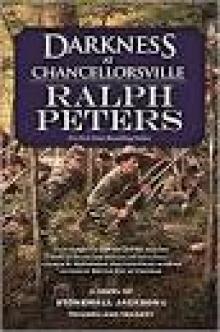 Darkness at Chancellorsville
Darkness at Chancellorsville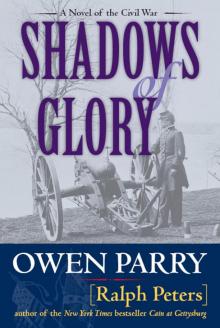 Shadows of Glory
Shadows of Glory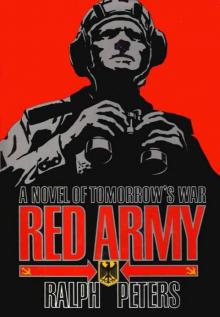 Red Army
Red Army Cain at Gettysburg
Cain at Gettysburg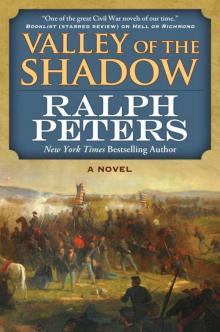 Valley of the Shadow: A Novel
Valley of the Shadow: A Novel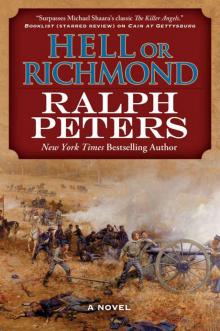 Hell or Richmond
Hell or Richmond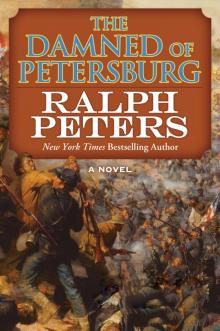 The Damned of Petersburg
The Damned of Petersburg The War After Armageddon
The War After Armageddon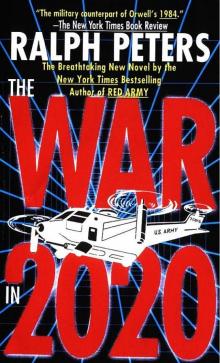 The War in 2020
The War in 2020